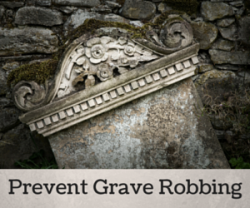How to Prevent Grave Robbing
Once upon a time, grave robbing was a real concern for families, cemeteries, and those who worked in the death industry. If a loved one was buried with any jewelry at all, the family ran the risk of the body being unearthed and the valuables stolen. Before the time of modern medicine, there was even a chance of the body itself being taken, as the number of donated cadavers was incredibly low, and anatomists would go to great lengths to acquire specimens.
These days, actual grave robbing is pretty rare. For one, caskets are buried inside vaults underground, so breaking through and getting to the casket requires quite a bit of work (and usually the help of a backhoe). For another, cemeteries have gated walls, security guards, and cameras hard at work to ensure that no one comes in under cover of night and desecrates the graves.
Unfortunately, all these protections don’t stop thieves for a new kind of grave robbing—taking advantage of your loss to steal the identity of the deceased. In an age when one of our most valuable assets is our credit score and social security number, grave robbing is less about stealing jewelry and more about accessing financial records.
How to Protect the Deceased against Identity Theft
Most identity thieves start as soon as they read an obituary or death notice. This tradition, meant to provide comfort and announce funeral times, has become a kind of advertisement for thieves to start looking into the deceased’s personal records. Before the notice is published, it’s a good idea to start taking proactive steps to protect your loved one’s information.
- Notify the Social Security Administration of Death: Funeral homes typically do this for you, but make sure it has happened before you start posting announcements.
- Send a Death Certificate to the Three Major Credit Reporting Agencies: Send copies of the death certificate to Experian, Equifax, and TransUnion.
- Close all Bank Accounts: Bank accounts should be closed or changed over to someone else’s name. You’ll need to provide a death certificate and proof of your legal right to access the money.
- Notify Regular Vendors: We all have people we pay monthly bills to—doctors, lawyers, loans, electric companies, pet caretakers, landscapers, just to name a few. Be extra careful and write each one a letter notifying them of the deceased’s death so they can take the proper steps on their end.
- Surrender the Deceased’s Driver’s License or ID Card: The DMV will need to be notified of death so that account can be closed.
- Automate Credit Check Reports: Set up an account so that you get credit reports in the deceased’s name for at least a year following death. There is usually a small fee associated with this, but you can keep a regular eye on the credit to ensure it isn’t being accessed.
In most cases, having a loved one’s identity be stolen is more of a hassle than a true financial hardship. You most likely won’t be responsible for purchases made in the deceased’s name, but the act of clearing everything up can take months (if not years), and add the stress of having to deal with the deceased’s loss all over again.
Be proactive early and often, and avoid modern-day grave robbing by diligently checking records long after the deceased has passed on.
Please share your thoughts on this article
Related articles
Map Your Digital Legacy
The more that technology is folded into our lives, the more difficult it becomes to deal with the digital aftermath of death. In the past, it was only necessary to close bank accounts, stop magazine subscriptions, and contact service providers in... more »
What is the Difference between a Casket and a Coffin?
Outside the funeral industry, the terms “casket” and “coffin” are often used interchangeably to describe the vessel in which the deceased is placed before being buried in the ground. Most people recognize both words, and are comfortable using... more »
Why Funeral Flowers Continue to be the Right Thing to Do
Green funerals are on the rise all over the United States, and more and more people are turning away from traditions like embalming and funeral flowers in lieu of eco-friendly alternatives. These steps are a great way to give back to the earth and p... more »




